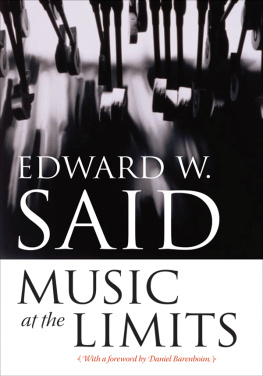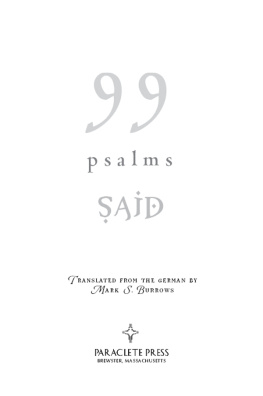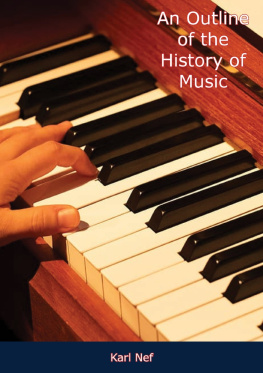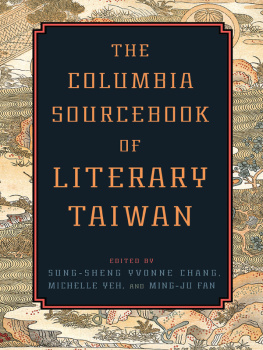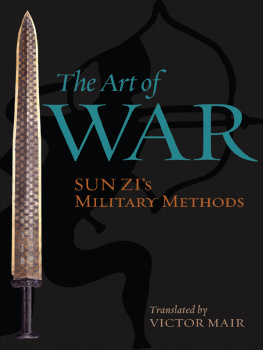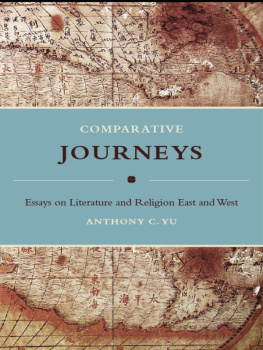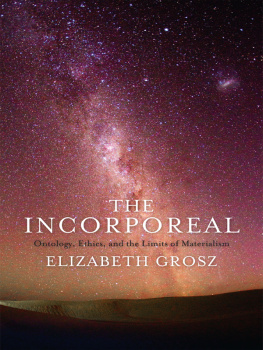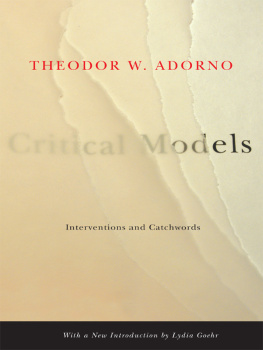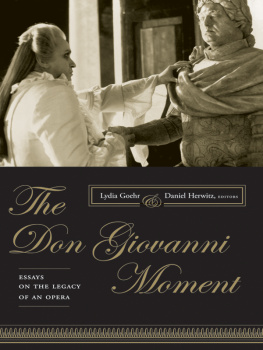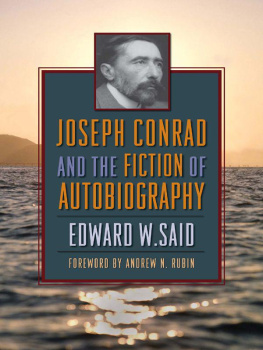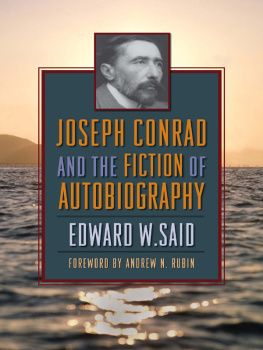MUSIC AT THE LIMITS
EDWARD W. SAID
MUSIC
at the LIMITS
Columbia
University
Press
New York
COLUMBIA UNIVERSITY PRESS
Publishers Since 1893
New York Chichester, West Sussex
cup.columbia.edu
Copyright 2008 Edward W. Said
All rights reserved
E-ISBN 978-0-231-51155-1
Library of Congress Cataloging-in-Publication Data
Said, Edward W.
Music at the Limits / Edward W. Said; foreword by Daniel Barenboim.
p. cm.
Includes index.
ISBN 978-0-231-13936-6 (cloth : alk. paper)ISBN 978-0-231-51155-1 (electronic)
1. Musical criticism. 2. OperaReviews. 3. OperasPerformances20th century. 4. ConcertsReviews. 5. MusicBook reviews I. Title.
ML3785.S34 2007
780.9dc22
2007002276
A Columbia University Press E-book.
CUP would be pleased to hear about your reading experience with this e-book at .
Contents
Daniel Barenboim
E DWARD SAID was a scholar with a remarkable breadth of interest. In addition to being well versed in music, literature, philosophy, and the understanding of politics, he was one of those rare people who sought and recognized the connections between different and seemingly disparate disciplines. His unusual understanding of the human spirit and of the human being was perhaps a consequence of his revelatory construct that parallels between ideas, topics, and cultures can be of a paradoxical nature, not contradicting but enriching one another. This is one of the ideas that I believe made Said an extremely important figure. His journey through this world took place precisely at a time when the value of music in society began to decline. The humanity of music, the value of musical contemplation and thought, and the transcendence of the idea as expressed through sound are all concepts that regrettably continue to decline even further in the modern world. Music has become isolated from other areas of life; it is no longer considered a necessary aspect of intellectual development. Just as in medicine, the music world has evolved into a society of specialists who know more and more about less and less.
His fierce anti-specialization lead him to criticize very strongly, and in my opinion very fairly, the fact that musical education had become increasingly poor, not only in the United Stateswhich, after all, had imported the music of Old Europebut also in the very countries that had produced musics greatest figures. Both Germany, that cradle of musical creation that produced Beethoven, Brahms, Wagner, Schumann, and many others, and France, the home of Debussy and Ravel, were, according to Said, allowing the quality and availability of their musical education to deteriorate. Furthermore, he perceived a trend that unsettled him exceedingly (an observation that united us very quickly): that musical education was becoming increasingly specialized and limited, even where it was readily available. In the best of cases, this type of education produces highly competent instrumentalists who possess little knowledge of theory and musicology but are highly advanced in the technical execution essential for a professional musician. What Said recognized, however, was the lack of a fundamental ability on the part of the musician to delve into, comprehend, and express the essential substance of music. After all, the nature of music is such that its content is inexpressible except through sound. Musical education today has moved further and further away from the deep and complex mystery of this essential truth and now focuses increasingly on the separation of the physical dexterity required to produce sound on an instrument and the sterile science of dissecting music structurally and harmonically without any active participation or experience of its power. Said deplored this development in the music business, and his concert reviews are full of the evidence of this antipathy.
No one could have exemplified the opposite of this microscopic focus more completely than Edward Said, which is not to say that he was uninterested in detail. On the contrary, he understood perfectly that musical genius or musical talent requires tremendous attention to detail. The genius attends to detail as though it were the most important thing and, in so doing, does not lose sight of the big picture; in fact, this attention to detail enables him to manifest his vision of the big picture. In music, as in thought, the big picture must be the result of the precise coordination of small details. When Said attended a concert or performance, he focused his attention on these details, some of which have gone unnoticed by many professionals. As a critic, he distinguished himself in many ways from his colleagues, of whom it can be said that some lack the knowledge to write about their subject matter intelligently and others lack the ability to listen without preconceptions. Of this second category it is clear that such critics have, at best, forged for themselves an idea of the correct interpretation of a certain work and are therefore capable only of making comparisons, favorable or otherwise, between the current performance and their own preconceptions to which they have become enslaved. Said, on the other hand, listened with open ears and a depth of musical knowledge that allowed him to hear, and attempt to understand, the intention of the performer and his approach to the music. Thus when reviewing a concert given by Celibidache and the Munich Philharmonic, he meanders into the philosophical realm of the nature of public performance, observing and comparing the performers who have had the imagination to question the tradition of the two-hour concert. His comments on Celibidaches notoriously slow tempi and theatrical pauses between movements are contemplative, insightful, and fair; they represent not a personal reaction to a deviation from the norm but an attempt to enter the mind of the performer and to understand his motivations.
Said had a refined knowledge of the art of composition and orchestration. He knew, for example, that at a certain moment in the second act of Tristan und Isolde, the horns withdraw behind the stage. A few bars later, the same note they played reemerges in the clarinets of the pit orchestra. I have had the honor and pleasure of collaborating on that piece with a great number of illustrious singers who were unaware of that detail and always looked behind them to see where the sound was coming from! They didnt know that the note no longer came from behind the stage, but from the pit. He took interest in such things; it was part of his meticulous interest in detail, which conferred upon his understanding of the whole an otherwise unimaginable grandeur. Edward Saids understanding of the world made it impossible for him to see only the obvious, the literal, the readily graspable: in his writing and in his life he continually discovered and brought forth evidence of the interconnected nature of all things, a notion he most probably derived from music. In music, there are no independent elements. One would like to believe it possible to take independent action in personal, social, or political realms that would have no further consequences, and yet one is constantly confronted with evidence to the contrary. It came naturally to Said, for example, to quote Keats when analyzing a performance of Bach or to compare the performance of Wagner in Israel with the reading of Joseph Conrads Heart of Darkness by a contemporary African. There were, for Edward Said, no two aspects of being human that were not related to one another.

